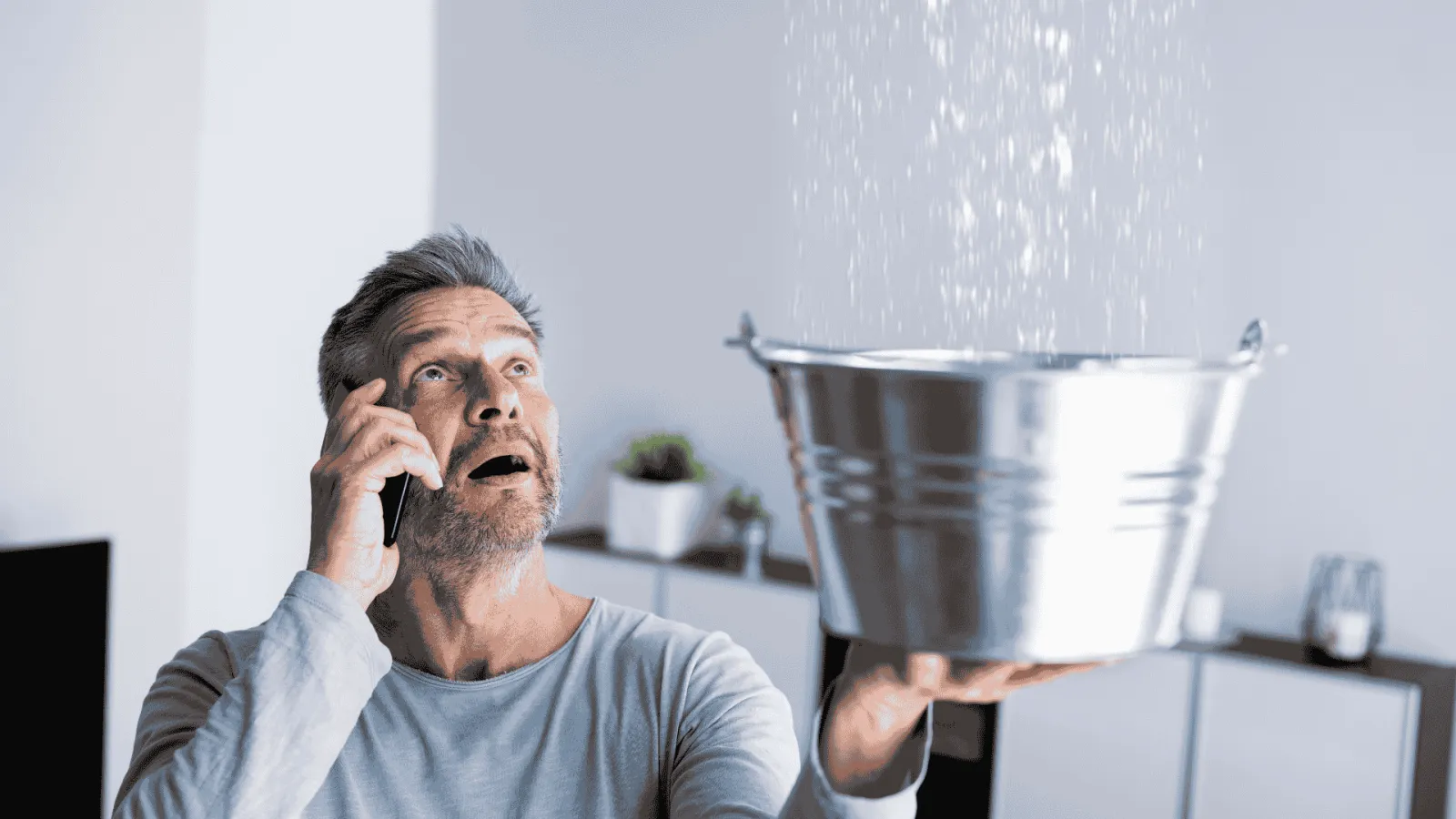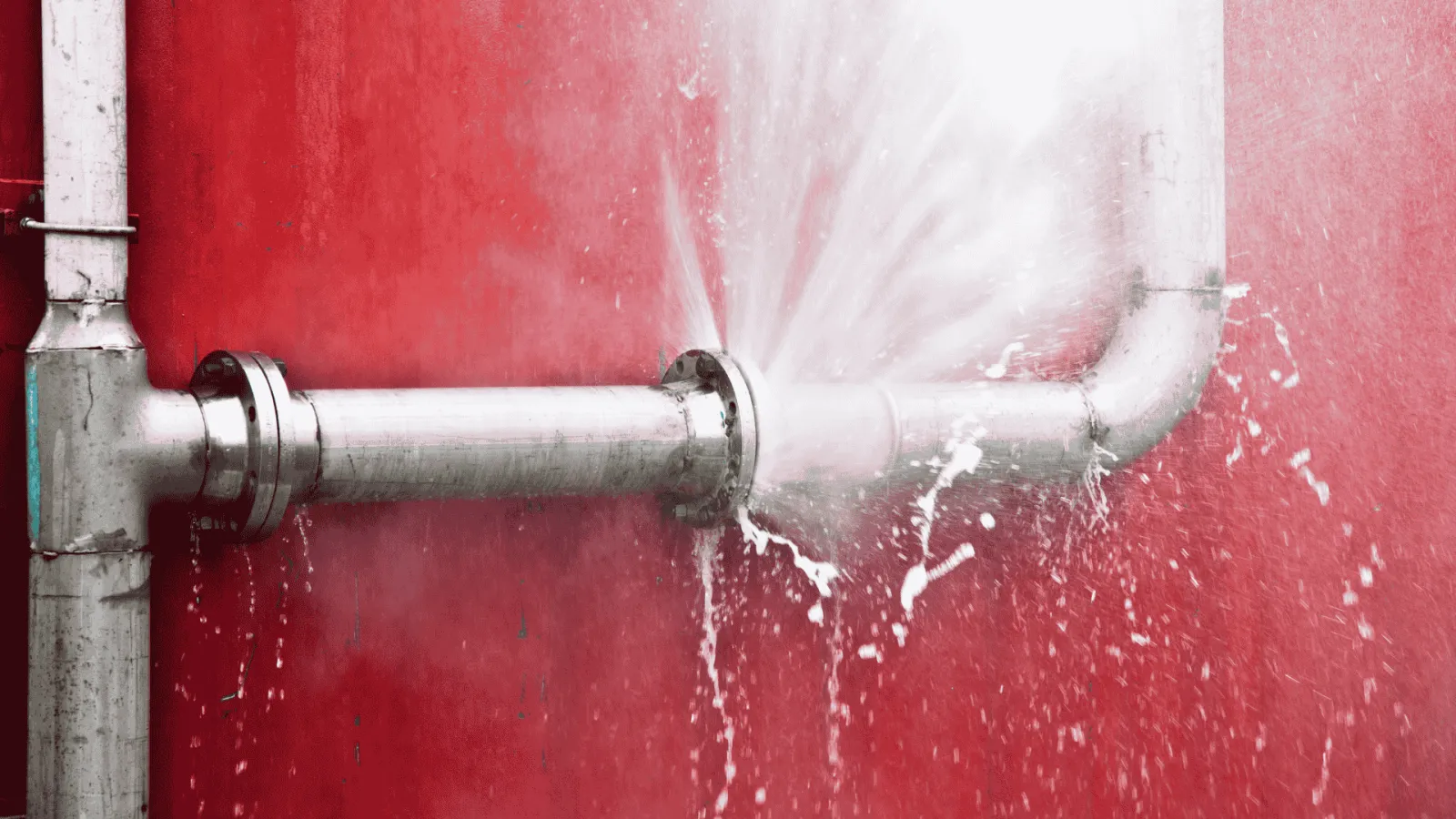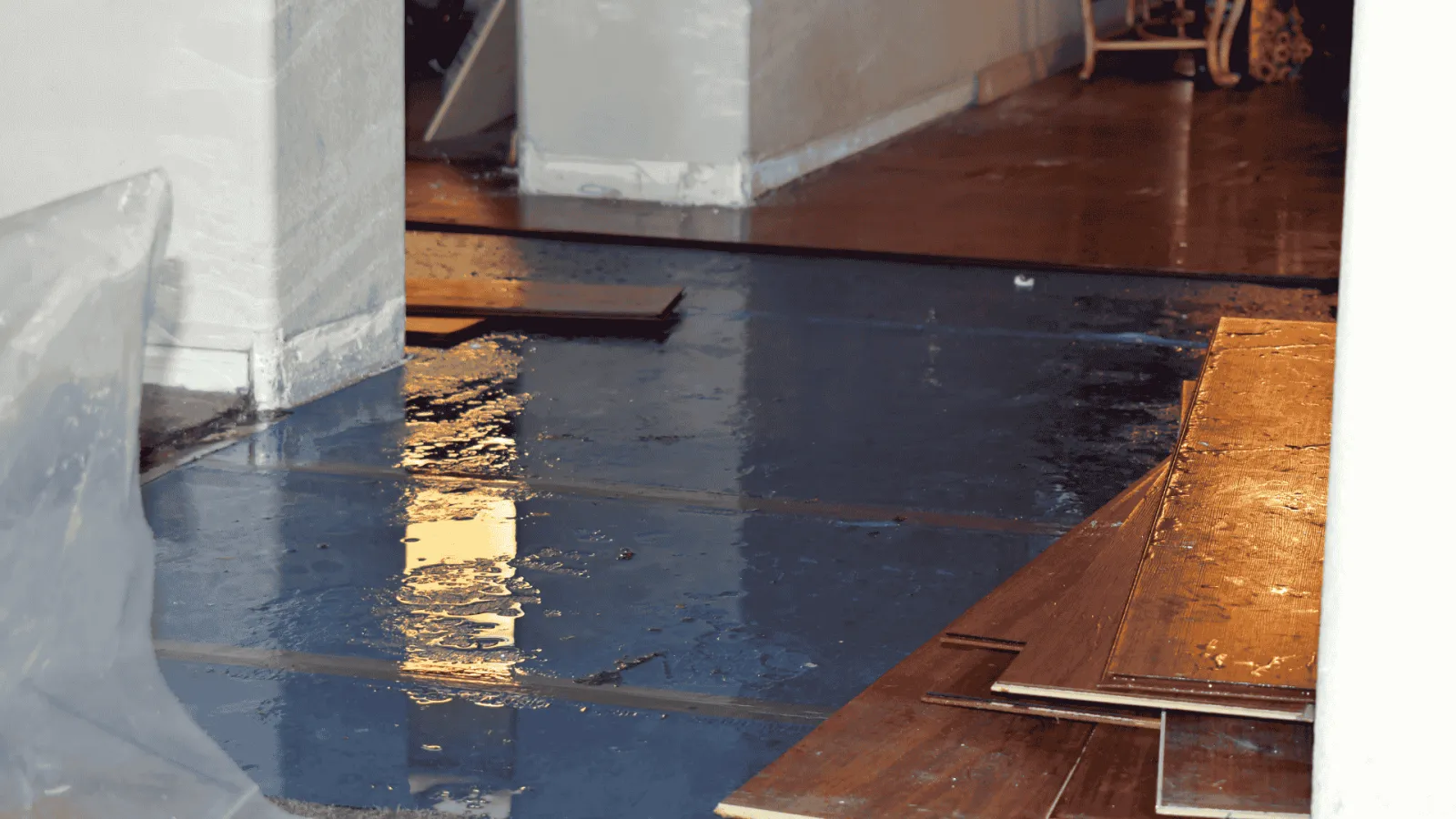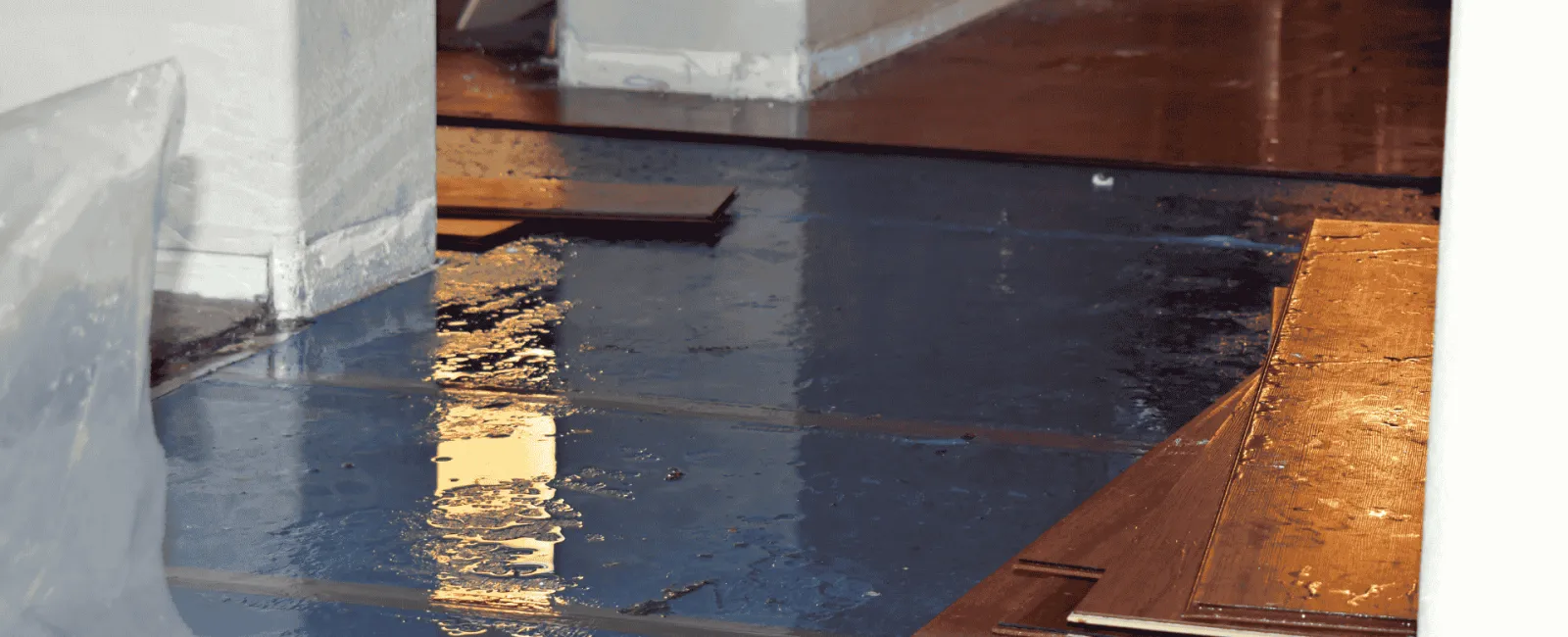November 11, 2025
What are the First Things to Do When a Pipe Bursts?
A burst pipe is every homeowner's nightmare. One moment everything is fine, the next you're dealing with water gushing into your living space, threatening your home and belongings. Whether it's the middle of a freezing winter night or a scorching summer afternoon, knowing exactly what to do when pipes burst can mean the difference between minor repairs and catastrophic damage.

What Causes Pipes to Burst?
Understanding why pipes burst helps you prevent them from bursting. Here are the most common culprits behind broken pipes in homes:
Freezing Temperatures
Even in mild winters, we do experience occasional hard freezes that catch homeowners off guard. When water inside your pipes freezes, it expands, creating immense pressure against the walls of the pipe. Even a small ice blockage can generate enough force to crack or burst the pipe. Pipes in unheated areas, such as crawl spaces, attics, garages, and exterior walls, are most vulnerable.
Corrosion and Age
Over time, pipes naturally deteriorate. Metal pipes can develop rust and corrosion from the inside out, gradually thinning the pipe walls until they become weak enough to rupture. If your home still has galvanized steel pipes or aging copper plumbing, you're at higher risk for corrosion-related pipe failures. Most residential pipes have a lifespan of 20 to 70 years, depending on the material, water quality, and usage patterns.
High Water Pressure
While high water pressure might seem like a luxury when you're showering, it's actually hard on your plumbing system. Excessive water pressure constantly stresses your pipes, joints, and fixtures. Over time, this can cause weak points to fail catastrophically. Most residential plumbing systems are designed to handle water pressure of 40-60 PSI (pounds per square inch), but we've measured water pressure exceeding 100 PSI in some homes.
Clogged Pipes
A severe clog doesn't just slow your drains; it can cause a pipe to burst. When water can't flow freely through your plumbing, pressure builds up behind the blockage. This sustained pressure can eventually cause the pipe to crack or rupture, particularly if it is already weakened by age or corrosion.
Tree Root Intrusion
Clay soil and mature trees create perfect conditions for root intrusion into underground pipes. Tree roots naturally seek out water sources, and they can infiltrate even small cracks in your sewer lines or water supply pipes. Once inside, roots expand and can cause pipes to crack and burst.
Physical Damage
Sometimes pipes burst due to external forces, such as construction accidents, shifting foundations, earthquakes, or even accidental punctures during home improvement projects. We've also seen pipes burst when homeowners attempt DIY repairs without proper tools or knowledge.
7 Warning Signs You Have a Burst Pipe

Not all burst pipes announce themselves with dramatic flooding. Some leaks are hidden behind walls, under floors, or underground. Here's how to spot the signs of a broken pipe before major damage occurs:
1. Visible Water Where It Doesn't Belong
This is the most obvious sign: water pooling on floors, dripping from ceilings, or streaming down walls. You may notice water seeping from under sinks, around toilets, or appearing in your basement or crawl space.
2. Sudden Drop in Water Pressure
If you turn on your shower or faucet and notice a dramatic decrease in water pressure throughout your home, you may have a significant leak or burst pipe. The water that should be reaching your fixtures is instead pouring out somewhere else in your plumbing system.
3. Unexplained Increase in Your Water Bill
A burst pipe that's hidden from view will still show up on your water bill. If your water usage suddenly spikes without explanation, no extra guests, no increase in irrigation, no lifestyle changes, you likely have a serious leak somewhere in your system.
4. Discolored Water
Brown, rust-colored, or murky water coming from your taps can indicate a burst pipe, especially if the break has occurred in an older metal pipe. The discoloration comes from rust, sediment, or even soil entering through the damaged pipe.
5. Water Stains on Walls or Ceilings
Yellow, brown, or dark stains spreading across your walls or ceiling are warning signs of water damage from a leaking or burst pipe. These stains typically indicate the water has been leaking for some time.
6. Strange Sounds in Your Walls
Hissing, whistling, or banging sounds coming from behind your walls can signal a pipe problem. You might also hear water running when all fixtures are turned off, a clear indication that water is escaping somewhere in your plumbing system.
7. Musty Odors or Visible Mold
A musty smell or visible mold growth can develop quickly after a pipe bursts, especially in hidden areas with poor ventilation. Mold thrives in moist environments, and a burst pipe provides the perfect conditions for rapid growth.
What to Do When a Pipe Bursts: Immediate Emergency Steps
When you discover a burst pipe, every second counts. Follow these critical steps to protect your home and minimize water damage:
Step 1: Shut Off the Main Water Supply Immediately
Your first priority is stopping the flow of water. Locate your main water shut-off valve and turn it clockwise to close it completely. In most homes, you'll find this valve:
- Where the main water line enters your house (usually in the basement, crawl space, or utility room)
- Near your water heater
- Outside your home near the water meter (sometimes in a concrete box in your yard)
If you're unsure where your shut-off valve is located, find it now, don't wait for an emergency. Every member of your household should know where it is and how to operate it.
After shutting off the main water, open all faucets (both hot and cold) throughout your home to drain remaining water from the pipes and relieve pressure.
Step 2: Turn Off Electricity to Affected Areas
Water and electricity are a dangerous combination. If the burst pipe is near electrical outlets, appliances, or your electrical panel, shut off power to those circuits immediately at your breaker box. If you're unsure which circuits to turn off, or if water is already near your electrical panel, it's safest to shut off power to your entire home.
Never step in standing water if electrical outlets or appliances could be submerged. If you can't safely access your breaker box, evacuate and call emergency services.
Step 3: Call a Licensed Emergency Plumber
Once you've stopped the water flow and addressed electrical hazards, call a professional plumber immediately. A burst pipe is not a DIY repair; improper fixes can lead to recurring leaks, water damage, and even more costly repairs down the line.
Dalmatian Plumbing offers 24/7 emergency plumbing services throughout the Atlanta metro area. When you call us at 404-314-3993, we'll dispatch a licensed plumber to your location right away. Our experienced technicians have seen every type of burst pipe scenario and can quickly assess the damage, locate the source of the problem, and perform lasting repairs.
Step 4: Document Everything for Insurance
While you're waiting for your plumber to arrive, start documenting the damage for your insurance claim:
- Take photos and videos of all water damage (walls, floors, ceilings, belongings)
- Make a detailed list of damaged items with descriptions, purchase dates if known, and estimated values
- Photograph the burst pipe itself once it's accessible
- Keep all receipts for emergency repairs, water removal services, and temporary housing if needed
Most homeowners' insurance policies cover sudden and accidental pipe bursts, but you'll need thorough documentation to support your claim.
Step 5: Remove Standing Water
Once it's safe to do so, begin removing standing water to prevent additional damage and mold growth:
- Use towels, mops, and buckets for smaller amounts of water
- Deploy a wet-dry shop vacuum for moderate flooding
- For extensive flooding, you may need to call a professional water damage restoration company with industrial pumps and dehumidifiers.
Move furniture, rugs, and belongings out of affected areas. The faster you can dry things out, the better your chances of saving them.
Step 6: Promote Air Circulation and Drying
Open windows (weather permitting) and run fans to increase air circulation. Use dehumidifiers to pull moisture from the air and prevent mold growth. Remove wet carpets, padding, and other porous materials that can't be thoroughly dried within 24-48 hours; these items are at high risk for mold contamination.
Step 7: Check Your Home's Temperature
If your pipe bursts due to freezing temperatures, you need to address the cold immediately to prevent additional pipes from freezing. Raise your thermostat, open cabinet doors under sinks to allow warm air to circulate around pipes, and consider using space heaters in particularly cold areas, such as basements or crawl spaces (but keep them away from water sources).
How Much Damage Can a Burst Pipe Cause?

The damage from a burst pipe can range from minor to catastrophic, depending on several factors:
- The pipe's location (visible vs. hidden)
- The size of the break
- How long had the water flowed before discovery
- What type of pipe burst (water supply vs. drain/sewer)
Structural Damage
Water pouring into your home can compromise structural integrity. Drywall absorbs water like a sponge, becoming heavy and eventually collapsing. Wood framing can warp, rot, and weaken. Water can seep into your foundation, potentially causing cracks and settlement issues. In severe cases, a burst pipe can cause ceiling collapse or significant structural failure requiring major repairs.
Electrical System Damage
Water infiltration into walls can damage electrical wiring, outlets, and fixtures. This creates serious fire hazards and can require extensive rewiring repairs. Water damage to your electrical panel or circuit breaker box is particularly dangerous and expensive to address.
Mold Growth and Health Hazards
Mold can begin growing within 24 to 48 hours of water exposure. Once established, mold spreads rapidly through walls, under floors, and in HVAC systems. Mold doesn't just damage your home; it poses serious health risks, including respiratory problems, allergic reactions, and more severe issues for people with compromised immune systems. Professional mold remediation can cost thousands of dollars.
Personal Property Loss
Water can damage or destroy everything in its path, furniture, electronics, appliances, flooring, carpeting, clothing, documents, and irreplaceable personal items. Even items that survive the initial flooding may suffer permanent damage from prolonged exposure to moisture.
Financial Impact
The total cost of a burst pipe includes:
- Emergency plumbing repairs
- Water damage restoration
- Mold remediation, if needed
- Structural repairs
- Replacing damaged belongings
- Increased water bills from the leak
- Potential temporary housing costs
- Insurance deductibles and possible premium increases
A single burst pipe can easily result in $5,000-$10,000 in damages for a minor incident, while major pipe failures can cause $50,000 or more in total damage. That's why having access to reliable emergency plumbing services in Atlanta is so critical; the faster you get professional help, the less damage you'll face.
How to Prevent Pipes from Bursting
The good news is that most burst pipes are preventable with proper maintenance and precautions. Here's how to protect your Atlanta home:
Insulate Vulnerable Pipes
Pipe insulation is inexpensive and highly effective at preventing freeze-related bursts. Focus on:
- Pipes in unheated spaces (crawl spaces, attics, garages)
- Pipes along exterior walls
- Outdoor hose bibs and irrigation lines
Foam pipe sleeves are readily available at most hardware stores and can be easily installed by the homeowner.
Maintain Adequate Home Temperature
During cold snaps, keep your thermostat set to at least 55°F, even when you're away from home. Open cabinet doors under sinks to allow warm air to reach pipes. If you're leaving town during winter, either drain your plumbing system or have someone check your home daily.
Let Faucets Drip During Freezes
When temperatures drop below freezing, let faucets served by exposed pipes drip slightly. Moving water is much harder to freeze than still water, and the small increase in your water bill is nothing compared to the damage caused by a burst pipe.
Address High Water Pressure
Have your water pressure tested. If it exceeds 60-70 PSI, install a pressure-reducing valve. This simple device protects your entire plumbing system from excessive stress, extending the life of all your fixtures and appliances.
Schedule Regular Plumbing Inspections
Annual plumbing inspections enable professional plumbers to identify issues before they escalate into emergencies. At Dalmatian Plumbing, our inspections include:
- Checking for signs of corrosion or deterioration
- Testing water pressure
- Inspecting exposed pipes for damage
- Evaluating the condition of your water heater
- Assessing drain function and identifying potential clogs
Replace Aging Pipes Proactively
If your home has old galvanized steel pipes, polybutylene pipes, or copper pipes showing signs of corrosion, consider proactive replacement before failure occurs. While repiping is an investment, it's far less expensive and disruptive than emergency repairs after a catastrophic burst.
Keep Pipes Clear
Prevent clogs by:
- Never pour grease down drains
- Using drain screens to catch hair and debris
- Avoiding chemical drain cleaners that can corrode pipes
- Scheduling professional drain cleaning every 1-2 years
Protect Pipes from Tree Roots
If you have mature trees near your home, schedule periodic sewer line inspections using video camera technology. This allows us to identify root intrusion early, before it causes major damage. Consider installing root barriers or removing trees that are located too close to underground pipes.
Know Where Your Pipes Are
Before any digging project, call 811 (Georgia's "Call Before You Dig" service) to have underground utilities marked. This free service prevents accidental damage to water lines, gas lines, and other utilities.
Will Insurance Cover a Burst Pipe?
Most homeowners' insurance policies cover water damage from burst pipes if the damage is sudden and accidental. This typically includes:
- Repair or replacement of the burst pipe
- Water damage to your home's structure
- Damage to personal belongings
However, insurance usually will NOT cover:
- Damage from pipes that burst due to a lack of maintenance or neglect
- Gradual leaks that developed over time
- Damage that could have been prevented
- The cost to access the pipe for repairs (in some cases)
- Mold damage beyond a certain limit
To maximize your coverage, maintain your plumbing system properly and document everything immediately when a burst occurs. Contact your insurance company as soon as possible after discovering the damage.
Don't Wait for Disaster. Get Help Now
A burst pipe emergency requires immediate professional attention. Every minute counts when water is pouring into your home. If you're experiencing a burst pipe right now, don't wait; call Dalmatian Plumbing's 24/7 emergency plumbing line immediately at 404-314-3993.
If you haven't had a plumbing inspection recently or are concerned about the age of pipes in your Atlanta home, schedule a preventive inspection today. We'll assess your plumbing system, identify potential problems, and recommend solutions to protect your home from costly burst pipe disasters.
At Dalmatian Plumbing, we're always alert, hardworking, and ready to tackle any plumbing challenge. Like the dependable Dalmatian, we're here to protect your home and spot problems before they become emergencies. Trust Atlanta's plumbing experts with over 25 years of local service, call us today.
Emergency Plumbing: 404-314-3993





